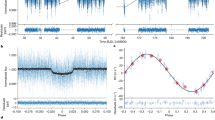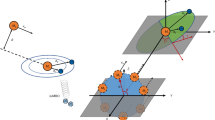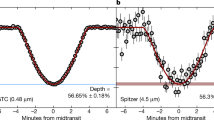Abstract
THE idea that the asteroids are fragments of an exploded planet was first put forward by Olbers more than 150 yr ago and has since been widely accepted. Recently Ovenden1, in an attempt to account for Bode's Law, has argued persuasively that a planet of 90 M⌖ vanished between Mars and Jupiter some 16 m.y. ago. According to this point of view the asteroids are remnants of this event.
This is a preview of subscription content, access via your institution
Access options
Subscribe to this journal
Receive 51 print issues and online access
$199.00 per year
only $3.90 per issue
Buy this article
- Purchase on Springer Link
- Instant access to full article PDF
Prices may be subject to local taxes which are calculated during checkout
Similar content being viewed by others
References
Ovenden, M. W., Nature, 239, 508 (1972).
Kuiper, G. P., Astron. J., 55, 164 (1950).
Alfvén, H., Icarus, 3, 52 and 57 (1964).
Robertson, H. P., Mon. Not. Roy. Astron. Soc., 97, 423 (1937).
Author information
Authors and Affiliations
Rights and permissions
About this article
Cite this article
NAPIER, W., DODD, R. The Missing Planet. Nature 242, 250–251 (1973). https://doi.org/10.1038/242250b0
Received:
Issue Date:
DOI: https://doi.org/10.1038/242250b0
This article is cited by
-
A Postulated Planetary Collision, the Terrestrial Planets, the Moon and Smaller Solar-System Bodies
Earth, Moon, and Planets (2013)
-
On the dynamical derivation of the Titius-Bode law
Celestial Mechanics (1988)
-
Electrolysis in space and fate of Phaethon
The Moon and the Planets (1980)
-
The missing planet
The Moon and the Planets (1978)
Comments
By submitting a comment you agree to abide by our Terms and Community Guidelines. If you find something abusive or that does not comply with our terms or guidelines please flag it as inappropriate.



